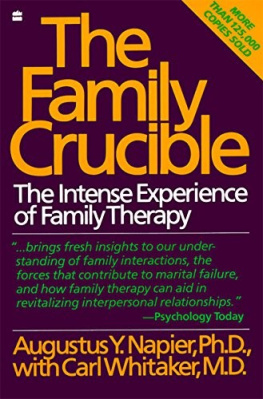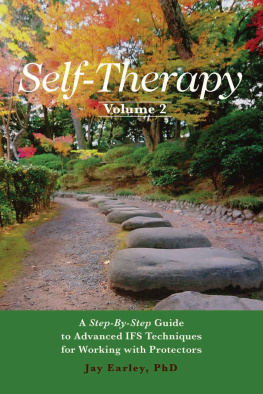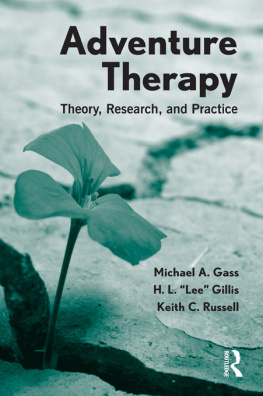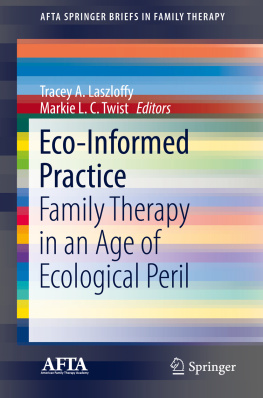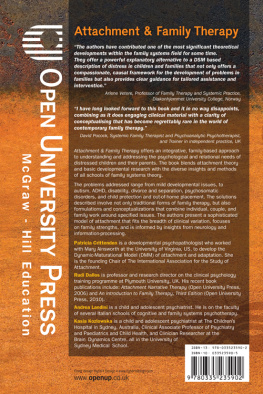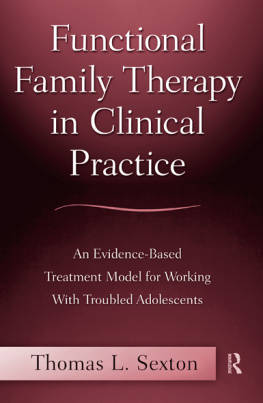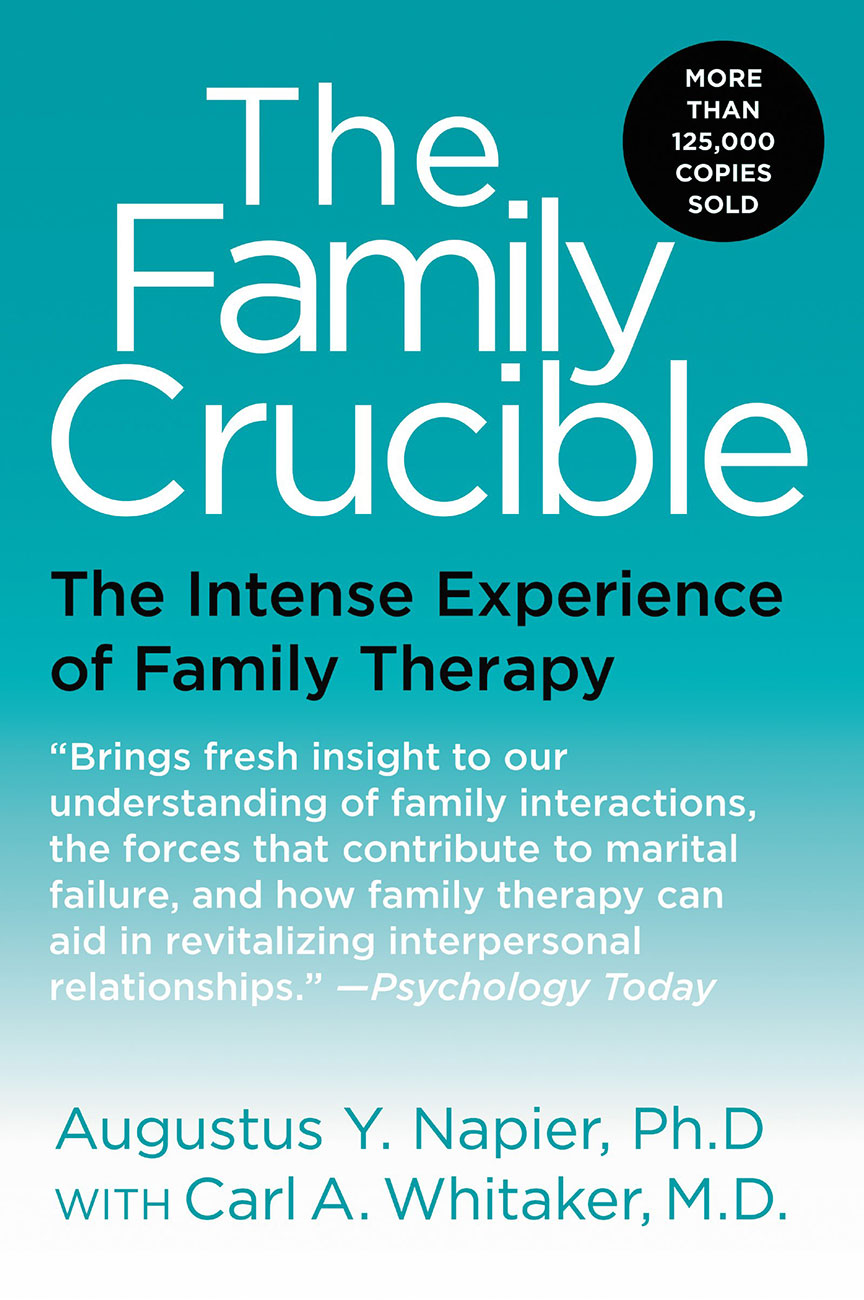THE FAMILY
CRUCIBLE

Augustus Y. Napier, Ph.D.
with
Carl A. Whitaker, M.D.

To the Memory of My Parents,
Augustus and Mary Ethel Napier
Contents
I began this book when I was in the last stages of training with Carl Whitaker, family therapist and professor of psychiatry at the University of Wisconsin. I came to the Psychiatry Department both to study with Carl and to complete an internship, the last requirement for a Ph.D. in clinical psychology from the University of North Carolina. Family therapy had become my major interest during graduate school, and I was fortunate to find an internship where I could study with such a skilled and widely respected family therapist. A postdoctoral fellowship allowed me to continue the training for a second year, and Carls generosity extended my apprenticeship through two years of more informal work.
Like many medical schools, Wisconsin honors an old tradition which encourages the medical professor to maintain a small private practice which keeps him abreast of the difficulties of practicing what he teaches. Carl also uses his private practice directly as a teaching medium. Though I attended many seminars and received supervision of my own cases, my most valuable training was in being Carls co-therapist with a number of families in his private practice. Out of that experience came the impetus for this book.
These interviews were powerful events for me. Some of the sense of power derived from Carls clinical skill and from his personal force; some of it came from the familys impressive struggle to change its own destiny; some of it seemed to come out of our teaming as co-therapists. I knew that there was a great deal of interest in family therapy among professionals, but little awareness of this exciting new field among lay persons. I wanted to document some of the changes in families that I had witnessed during my training.
In the beginning I went over audiotapes of interviews that Carl and I had conducted together, and I studied videotapes of consultation interviews that he had led in various training institutes. Digging into these interviews was fascinating, but it was also frustrating. I quickly became enmeshed in a nightmare of complexity as I tried to describe the nuances of voice, the peculiarities of phrasing, the intricate sequence of events in the interviews. I wrote fifty pages about a single hour of therapy and felt that I had treated the material superficially! So focused was I on details that I lost all sense of the flow and the drama of family therapy.
I decided to step back from the material and to try to capture the feel of family therapy. Choosing a family whose treatment had been recorded on audiotape and which I had studied carefully, I began to write from memory, drawing in episodes from other cases as they seemed useful to illustrate the process of therapy. I added paragraphs and chapters of explanation to clarify both this case and the larger family therapy approach. While every major episode of the Brices therapy is based on an actual occurrence, their story is truly a composite of various families experiences in therapy, and is therefore a fictionalized account. Nevertheless, I think the result is a more accurate portrayal of family therapy than was my earlier presentation of the facts.
The book went with me through a number of experiences. As my own career developed, I shifted from being Carls student to being his friend and colleague. I found that in my own private practice I began to develop ideas about family therapy that were somewhat different from Carls; and while my separate views have only served to enrich our association, the book had to change as I changed.
By injecting more of my own view of family therapy into this book, I may have failed to render an accurate portrait of Carls subtle and indirect artistry. Those who know his work well may feel that I did not capture fully his skillful use of paradox, metaphor, and humor. This omission is the inevitable consequence of the writers seeing the world through his own eyes. When Carl talks to the family he sometimes speaks the language of the unconscious mind; I tend to speak to the conscious mind and to teach. Fortunately or unfortunately, the language here is predominantly mine.
Although I conceived the idea of the book and did all the writing, I had a great deal of assistance from several people. Carls ideas form the real basis for this book. He also collaborated closely with me as I wrote. We outlined the conceptual chapters together, and he offered many helpful suggestions as the book was revised.
Ann Harris, my editor, has been a major contributor to this effort. Her warm, buoyant voice sustained me through periods of discouragement, and her extremely perceptive commentary taught me about much more than the technicalities of writing. Like a good therapist, she not only counseled me to be true to myself, but helped me see more clearly what is natural for me. Ann labored longer and harder over this manuscript than I ever imagined an editor doing, and I am grateful to her.
A number of people read the manuscript and offered useful suggestions, among them my wife, Margaret, my students, and David Keith, a family therapist who is both Carls and my close associate.
Finally, my thanks to Cindy Hackett and the other secretaries in the Psychiatry Department who spent so many hours typing and retyping this manuscript. They were this books first readers, and their enthusiasm for what they were typing was very welcome.
CHAPTER 1
The Question of Structure
Would you like to see a new family with me? Carl said. The voice on the telephone was that of my present colleague and former teacher, and he sounded less casual and confident than usual. A father whos a VIP lawyer, an angry mother, and a teenage daughter who sounds stormy as hell. His invitation sounded a little like a friendly dare.
Sure, I said instantly. When? Usually I would think carefully before agreeing to be someones co-therapist, but not when the person asking was Carl Whitaker.
We found a joint opening later in the week. Ill check with the family, Carl promised. He was about to hang up when I asked, Anything I should know before we begin?
Carl was obviously in a hurry. Nothing except that the situation is very tense. The family was referred by a child psychiatrist in town who says that the girls getting worse. Hes been seeing her individually. The family isnt sold on family therapy, but they say theyll all come once.
How many in the family? I asked.
Five. Theres a younger brother and sister.
Ill bring my work gloves, I said amiably, letting him go. See you Thursday.
Even though the distance from my office to the Psychiatry Department where Carl teaches is only a couple of miles, I was late for the appointment. It was a cool, beautiful June day, and I had let the drive be a leisurely one. As I strode into Carls office, I realized that I had unconsciously given him time to tell the family why he felt he needed a second therapist and to offer my credentials for the job. He would have mentioned that I was a psychologist in practice nearby and a trusted colleague. He would have talked about the power that families have and how we therapists can be more effective if we work as a team. Since the family had been referred primarily to him, the public relations effort would be helpful. I wasnt sorry for the delay.


